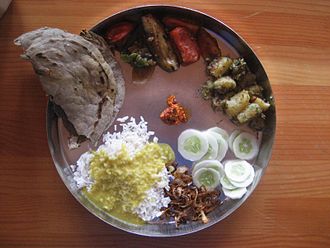Customs and etiquette in Indian dining
Customs and Etiquette in Indian Dining[edit]

Indian dining customs and etiquette are deeply rooted in the country's diverse cultural and religious traditions. These practices vary significantly across different regions and communities, reflecting the rich tapestry of Indian society. Understanding these customs is essential for anyone wishing to fully appreciate the Indian dining experience.
Dining Environment[edit]
In India, meals are often a communal affair, with families and friends gathering to share food. Traditionally, meals are served on the floor, with diners sitting cross-legged on mats or cushions. However, in urban areas, dining tables and chairs are becoming more common.
Meals are typically served on a banana leaf or a thali, a round metal plate. The use of banana leaves is particularly prevalent in southern India, where it is believed to enhance the flavor of the food and is considered environmentally friendly.
Eating with Hands[edit]
One of the most distinctive aspects of Indian dining is the practice of eating with the hands. This custom is based on the belief that eating with the hands engages all the senses and enhances the dining experience. It is important to use only the right hand for eating, as the left hand is considered unclean in many parts of India.
Order of Serving[edit]
Meals in India are often served in a specific order. Typically, a meal begins with lighter dishes such as appetizers or salads, followed by the main course, which includes a variety of curries, lentils, and rice or bread like naan or roti. The meal concludes with desserts and paan, a betel leaf preparation that aids digestion.
Vegetarianism and Dietary Restrictions[edit]

Vegetarianism is prevalent in India, particularly among Hindus, Jains, and Buddhists. Many Indians follow a vegetarian diet due to religious beliefs, and it is common for meals to be entirely vegetarian. In some communities, vegan diets are also observed.
Hospitality and Guest Etiquette[edit]
Hospitality is a cornerstone of Indian culture. Guests are treated with great respect and are often served first. It is customary for the host to insist that guests have second helpings, as this is a sign of generosity and goodwill.
Dining Etiquette[edit]
When dining in India, it is important to follow certain etiquette rules:
- Washing Hands: Always wash your hands before and after meals.
- Serving Others: It is polite to serve others before serving yourself.
- Finishing Your Plate: Leaving food on your plate is considered wasteful and disrespectful.
- Compliments: Complimenting the host on the food is appreciated.
Special Occasions and Feasts[edit]

Special occasions such as weddings, festivals, and religious ceremonies often involve elaborate feasts. These events showcase a wide array of dishes and are an opportunity for families and communities to come together in celebration.
Related Pages[edit]
Ad. Transform your life with W8MD's Budget GLP-1 injections from $49.99


W8MD offers a medical weight loss program to lose weight in Philadelphia. Our physician-supervised medical weight loss provides:
- Weight loss injections in NYC (generic and brand names):
- Zepbound / Mounjaro, Wegovy / Ozempic, Saxenda
- Most insurances accepted or discounted self-pay rates. We will obtain insurance prior authorizations if needed.
- Generic GLP1 weight loss injections from $49.99 for the starting dose of Semaglutide and $65.00 for Tirzepatide.
- Also offer prescription weight loss medications including Phentermine, Qsymia, Diethylpropion, Contrave etc.
NYC weight loss doctor appointmentsNYC weight loss doctor appointments
Start your NYC weight loss journey today at our NYC medical weight loss and Philadelphia medical weight loss clinics.
- Call 718-946-5500 to lose weight in NYC or for medical weight loss in Philadelphia 215-676-2334.
- Tags:NYC medical weight loss, Philadelphia lose weight Zepbound NYC, Budget GLP1 weight loss injections, Wegovy Philadelphia, Wegovy NYC, Philadelphia medical weight loss, Brookly weight loss and Wegovy NYC
|
WikiMD's Wellness Encyclopedia |
| Let Food Be Thy Medicine Medicine Thy Food - Hippocrates |
Medical Disclaimer: WikiMD is not a substitute for professional medical advice. The information on WikiMD is provided as an information resource only, may be incorrect, outdated or misleading, and is not to be used or relied on for any diagnostic or treatment purposes. Please consult your health care provider before making any healthcare decisions or for guidance about a specific medical condition. WikiMD expressly disclaims responsibility, and shall have no liability, for any damages, loss, injury, or liability whatsoever suffered as a result of your reliance on the information contained in this site. By visiting this site you agree to the foregoing terms and conditions, which may from time to time be changed or supplemented by WikiMD. If you do not agree to the foregoing terms and conditions, you should not enter or use this site. See full disclaimer.
Credits:Most images are courtesy of Wikimedia commons, and templates, categories Wikipedia, licensed under CC BY SA or similar.
Translate this page: - East Asian
中文,
日本,
한국어,
South Asian
हिन्दी,
தமிழ்,
తెలుగు,
Urdu,
ಕನ್ನಡ,
Southeast Asian
Indonesian,
Vietnamese,
Thai,
မြန်မာဘာသာ,
বাংলা
European
español,
Deutsch,
français,
Greek,
português do Brasil,
polski,
română,
русский,
Nederlands,
norsk,
svenska,
suomi,
Italian
Middle Eastern & African
عربى,
Turkish,
Persian,
Hebrew,
Afrikaans,
isiZulu,
Kiswahili,
Other
Bulgarian,
Hungarian,
Czech,
Swedish,
മലയാളം,
मराठी,
ਪੰਜਾਬੀ,
ગુજરાતી,
Portuguese,
Ukrainian